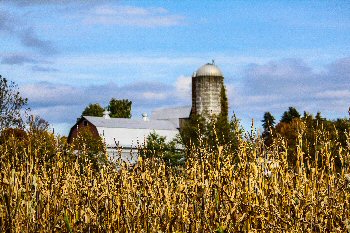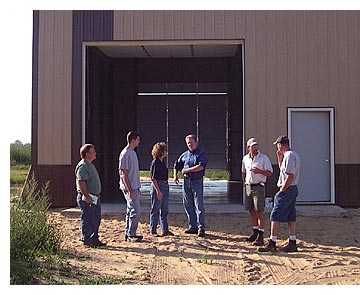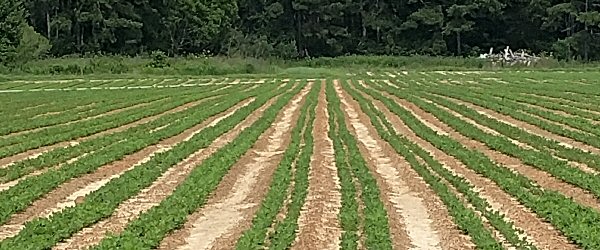
"Putting the Farm Bill to Work" in Michigan has increased the ability of specialty crop producers in Michigan — apple, cherry, asparagus, and nursery crops — to make use of federal conservation programs in applying practices that reduce pesticide risk and conserve natural resources. The project was a cooperative effort with Michigan State University IPM Program, Cherry Marketing Institute, Michigan Asparagus Advisory Board, Michigan Nursery and Landscape Association, Michigan Apple Committee and Gerber Products. The project demonstrated that well executed partnership efforts can make a dramatic increase in grower participation in conservation programs in support of greater use of environmentally sound farming practices.
Efforts to increase grower awareness began in the summer and fall 2004 with the creation of feature length articles, produced by the MSU IPM Program, highlighting participation in EQIP by fruit, vegetable, and nursery growers. The articles were included in Fruit Grower News, Vegetable Grower News, Farmer Advance, the Gerber Newsletter to growers, and Michigan Landscape (publication of Michigan Landscape and Nursery Association), and Michigan Apple News (which ran two articles). Versions of the information piece describing EQIP opportunities and the guide "Success with EQIP" were created to be specifically relevant to nursery and apple growers and their unique production practices.
As a result of these efforts, a further increase in grower knowledge and interest about EQIP occurred in the four counties involved in the 2004 project. As measured by surveys conducted at winter grower meetings, the percentage of growers who indicated that they knew how to apply to EQIP increased from 45% in 2004 to 56% in 2005, and the percentage of growers interested in applying had increased from 64% to 78%. In the counties newly included in education and awareness efforts, a higher percentage of growers indicated awareness of EQIP than a similar group of growers in 2003. In those other counties, 60% of growers stated that they were aware of or had heard about EQIP.
During the winter, the consultants provided assistance to growers in understanding the application process, developing conservation plans and applying to EQIP. They were able to help growers take advantage of an increased incentive payment rate for pest management practices set at $60.00/acre for fruit, vegetable and nursery crops with a cap of $5500/farm/year.
 In Oceana, Mason, Leelanau, Grand Traverse, Antrim and Benzie counties numbers indicate that 34 of the growers to whom they provided assistance have received contracts covering 7183 acres of cropland. The practices applied by those growers include pest management, nutrient management, cover crops, filter strips, windbreaks, and agricultural containment facilities. In these counties alone growers have received contracts totaling $3 million dollars over the past two years. In Kent and Ottawa counties 11 apple growers submitted applications including 870 acres with the assistance of CAP’s consultant. For nursery crops, in Ottawa County, 6 nursery growers have submitted applications with assistance from a CAP consultant. Finally as a result of the heightened interest among grape growers, according to NRCS, has resulted in a dozen new applications from grape growers in Berrien and Van Buren counties.
In Oceana, Mason, Leelanau, Grand Traverse, Antrim and Benzie counties numbers indicate that 34 of the growers to whom they provided assistance have received contracts covering 7183 acres of cropland. The practices applied by those growers include pest management, nutrient management, cover crops, filter strips, windbreaks, and agricultural containment facilities. In these counties alone growers have received contracts totaling $3 million dollars over the past two years. In Kent and Ottawa counties 11 apple growers submitted applications including 870 acres with the assistance of CAP’s consultant. For nursery crops, in Ottawa County, 6 nursery growers have submitted applications with assistance from a CAP consultant. Finally as a result of the heightened interest among grape growers, according to NRCS, has resulted in a dozen new applications from grape growers in Berrien and Van Buren counties.
Finally the project made its experiences available to audiences at the national level. An article was published in the Journal of Economic Entomology, The Case and Opportunity for Public-Supported Financial Incentives to Implement Integrated Pest Management [97(6): 1782-1789 (2004)]. Testimony was also submitted for the House Agriculture Committee Subcommittee on Conservation, Credit, Rural Development and Research Hearing on June 15, 2004, Regarding Implementation of the Conservation Title of the Farm Security and Rural Investment Act of 2002. Both of these documents discussed the lessons learned from the Michigan work and set out the continuing challenges.
Conclusions
Through this project we have demonstrated that it is possible to make changes in the NRCS procedures that increase opportunities for specialty crop producers. We have also seen that persistent efforts to raise awareness and improve grower knowledge can lead to increased grower use of conservation practices.
Putting the Farm Bill to Work Quick Links
- Appalachian Region
- California
- Georgia
- Michigan
- North Carolina
- North Carolina Apple Growers
- North Carolina Nursery Crops
- North Carolina Christmas Trees
- North Carolina Strawberry Growers
- North Carolina Strawberry Survey
- North Carolina Sweetpotato Producers
- North Carolina Sweetpotato Survey Summary
- Western North Carolina Vegetable Growers
- Oregon

